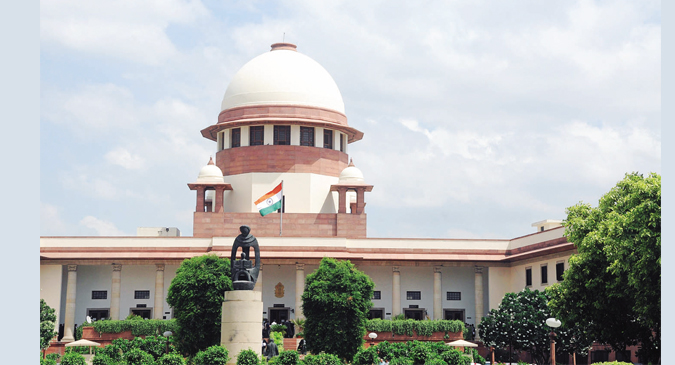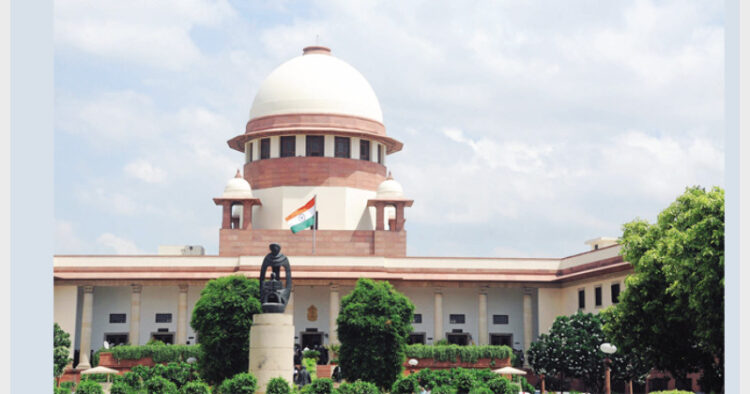All three pillars of Indian democracy have to respect each other’s authority and should stop well short of meddling into affairs that are the sole prerogative of a particular branch
Mayank Gupta
One is taught during school days the three pillars of Democracy—the Legislature, Executive and Judiciary. On its plain reading, the subject may not invoke much curiosity but the turn of events, both political and non-political, in the post-Independent India has added interest and the need for a renewed debate on the so-called principle of ‘separation of powers’. In the present set of circumstances, when many state institutions are either seeking more autonomy in their functioning or alleging interference and intrusion in their independence, it becomes imperative when we revisit the topic. Add to this the latest debate triggered by a retired Supreme Court Judge who has accused a former Chief Justice of India of being influenced by external forces in his decision-making process.

Every intellectual would agree on the aspect that for justice to be fair and unbiased, the judiciary must remain independent and no meddling, even by those occupying top administrative and political offices, must be tolerable. True it is. Courts hear suits against governments and their agencies such as the CBI and Income Tax Department, and to uphold justice, anyone who has committed a wrong must be punished. In the Indian setup of things, no one can be above the law and all stand equal before it. One can also say that the judiciary is the most vital of the three pillars, for the executive led by the Prime Minister or Chief Minister and the Legislature comprising of chosen representatives of people may, at times, have some vested interests while discharging their duties. This thought places the court above all and thereby makes its rulings binding.
Having noted the significance of judiciary, one should also consider the two other pillars. Justice, it is true, prevails when we have a robust judicial system, but what about socio-economic development which relies primarily on the Executive and Legislature? Take, for example, a decision of the Executive to pave new roads and highways without which progress cannot be sought. Legislature too enacts new legislations and amends the existing ones to keep up with contemporary needs of the public at large. These actions help open up India to foreign investment, criminalise harassment of women at workplaces and bar employment of children in hazardous workplaces. Now, what if someone places impediments in the implementation of these initiatives? Would the pace of development not stall and the exercise of poverty alleviation and upliftment of the backward get delayed?
Judicial activism must be confined within legitimate contours so as to let the democracy thrive on the united labours and expertise of the three branches This question sparks a debate on what is the justifiable limit of judicial activism within a democracy; a limit defined as such that neither the authority of judiciary is undermined nor the other two branches are prevented from discharging their functions. In her dissenting note in the Sabarimala case verdict, the Supreme Court Judge had prudently advised of leaving the matters of faith out of the scope of judicial intervention. Many thinkers and intellectuals praised her view which reflected that liberalism too has limits and societal norms can be much better decided by members of that society as against by a bench of few judges. This is not an isolated case. Policy decisions of the executive and legislature have been overturned by the judiciary, although in most of the cases judiciary’s stand can be termed rational and in wider public interest (such as capping quota at 50 per cent). Still, there are instances when judicial intervention did overreach the mandate.
Judicial activism sounds as a liberal, democratic, progressive expression. Public Interest Litigations (PIL) have added to this concept and the delivery of justice now appears more accessible and timely. But did it also weaken Executive and Legislature? In some respects, this is true. The framing of laws in public interest is the exclusive domain of the Legislature and this right should not be compromised since it results in subverting the Indian Constitution.
Of late, many laws have been declared unconstitutional by the courts and this indirectly takes the power away from the Legislature. The right course can be referring the law in question to the concerned Legislature and stipulating a fixed time for deliberation over the issue to be followed by corrective action, if desirable. After all, Legislature comprises of representatives chosen by the electorate to take decisions on their behalf.
On the similar line, although the judiciary is burdened under litigations, cases where the subject-matter is of critical importance must not be unreasonably delayed. One such case is the Ayodhya dispute. Judicial pronouncements in India have always been respected and the state apparatus has never attempted to circumvent the judgments, barring a few exceptions such as enactment of Muslim Women (Protection of Rights on Divorce) Act, 1986 by the then Congress government to shrewdly reverse the Supreme Court judgment favouring the right to maintenance of Muslim women. The Ram Janmabhoomi dispute has become nothing but a political tool for competing forces and it cannot be accepted that judges aren’t aware of developments around the issue. Why then this subject is being allowed by the court to be politicised by regularly deferring the matter is inexplicable.
The bottom line is that all three pillars of the Indian democracy have to respect each other’s authority and should stop well short of meddling into affairs that are the sole prerogative of a particular branch. In this light, judicial activism too must be confined within legitimate contours so as to let the democracy thrive on the united labours and expertise of the three branches.
(The writer is a student of Development Economics at University of London and a columnist)














Comments